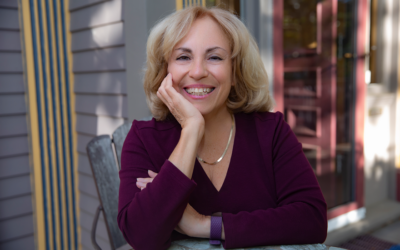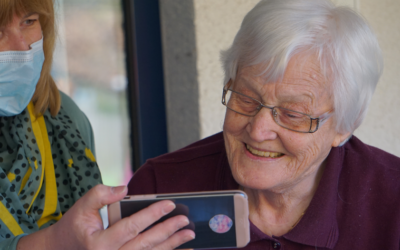This mortgage strategy can make it more affordable for grandparents to move closer to grandchildren.
In the past several weeks, it’s been exciting to read about the newly vaccinated grandparents who have hugged their grandchildren for the first time in a year.
I imagine I’ll soon be approached by prospective clients who crave more of these hugs. They may be eager to sell their homes and move closer to their grandchildren — before encountering some unexpected hurdles. Among them:
• An incredibly tight housing market with reduced inventory.
• Dramatic price appreciation that could force them from a generously proportioned home into a dollhouse.
• Higher housing costs in other regions.
Restarting Life with a Financial Cushion
In these situations, they may feel stuck. Their mortgages may be paid off, and they may already be enjoying a comfortable retirement. The prospect of starting over elsewhere, saddled with debt for a less desirable house, may put their dreams on the shelf. However, there may be “hidden” options that enable them to spend the rest of their retirement closer to family.
One of these could be a specific type of reverse mortgage — a H4P reverse mortgage [Home Equity Conversion Mortgage (HECM) for purchase] loan. Insured by the Federal Housing Administration (FHA), a purchase reverse lets borrowers keep more of the proceeds from the sale of their current residence, buy a home and avoid monthly mortgage payments thereafter. The borrower just needs to pay taxes, insurance, and maintain the home.
The loans are available to individuals/couples who are at least 62 years old and can commit to a down payment of about 50% of the purchase price, on average. (The exact percentage is determined by their age, interest rates and other variables.)
The reverse mortgage loan can give them the extra funds they need to finance a purchase, put more cash in the bank and restart their lives.
Moreover, as long as they pay their homeowner’s insurance and property taxes, and keep up general maintenance, they don’t have to repay the loan until they move again. (If they pass away while still in the home, the balance will be deducted from its eventual sale.)
A H4P is a potential option for most senior buyers.
Among situations where it might not be feasible:
If the buyers’ child will be living with them, staying in the home when they pass away and is currently too young to go on the H4P mortgage with the parent. The adult child would need to be in a position to refinance or pay off the H4P mortgage in order to remain in the home.
• If the buyer is not walking away from the sale of their current house with sufficient funds. The average 50% down payment requirement (less for older buyers), in effect, eliminates certain buyers from this purchase option.
• While the FHA H4P product is the same throughout the country, generally speaking, borrowers should look to work with a reputable mortgage company with a knowledgeable loan officer, who is able to discuss their personal circumstances.
A Tale of Two Grandparents
How might a H4P mortgage benefit the grandparents who want to live closer to their grandchildren?
Let’s consider the fictional couple, Karen and Joseph, retirees who will move from Maine to Massachusetts. They own a $500,000 home, free and clear, and will need $700,000 for a comparable property.
Their house sells for the $500,000 asking price. They take out a $350,000 purchase reverse to finance half of the payment on their new $700,000 home and use $350,000 from the sale proceeds to fund the balance. After commissions and closing costs, they still have close to $150,000 in extra cash, and will not have required mortgage payments.
This is just one example of the client situations I routinely encounter where a purchase reverse could be helpful. Others include:
Rightsizing
Donna and Craig, also both retired, live in the $800,000 colonial where they raised their family. They have paid off their original mortgage and now need a smaller, one-floor house where they can age in place. They find the perfect home in the same community for $600,000.
The couple could simply plow the proceeds from their original home into their new one — but that would leave them with relatively little cash at their stage of life.
Instead, they decide to put just $300,000 of the sale proceeds toward a down payment. They pay for the balance using a $300,000 purchase reverse, that has no required mortgage payments.
Now they have about $500,000 in extra cash from the sale of their home ($800,000 minus the $300,000 they put down), versus just the $200,000 they would have cleared without the additional financing.
Moving from a House to a Condominium
Individuals and couples can use purchase reverses to buy single-family homes, two- to four-unit dwellings, or condominiums that are approved by the FHA. Whatever they purchase must become their primary residence.
That’s fortunate for Lois, a Boston-based widow who can’t fathom the thought of one more winter shoveling her driveway and sidewalk.
She has a gorgeous, historical home with original moldings that she could sell for $1.2 million. She paid off the mortgage years ago, has a healthy portfolio of savings and investments, and wants to retain enough cash to fund her comfortable lifestyle.
She finds a $750,000 condominium in the same community, and it’s adjacent to her best friend’s unit. With a $375,000 purchase reverse and $375,000 from the sale of her home, she’s ready for an easier life in the winter — and she’ll enjoy having $825,000 in extra cash from her home’s sale, as well.
Her two adult children recently started a technology business together, and she is excited to use some of the proceeds to help them now, rather than leaving them the money when she passes away. She would rather assist them at a time of real need when she is alive to see the boost it gives them.
A Hidden Way to Realize New Dreams
COVID-19 has prompted all of us to cherish what really matters and do what we can to realize our dreams. As COVID-19 vaccinations free us — and our clients — to resume our lives, I expect more baby boomers and older seniors will be relocating with renewed purpose. In many cases, a purchase reverse will offer them an opportunity to reach out for what they’ve missed most: A simple hug.
Photo by unsplash.com/@tomlarsen




